rollup
一:什么是Rollup?
对于前端项目来说,因为有静态资源(如图片、字体等)加载与按需加载的需求,所以使用 webpack 是不二选择,但对于第三方库来说,其实还有更好的选择:rollup。当我们使用ES6模块编写应用或者库时,它可以打包成一个单独文件提供浏览器和Node.js来使用
webpack 在打包成第三方库的时候只能导出 amd/commonjs/umd,而 rollup 能够导出 amd/commonjs/umd/es6。使用 rollup 导出 es6 模块,就可以在使用这个库的项目中构建时使用 tree-shaking 功能。
对于有样式文件(css、less、scss)、静态资源文件(图片、字体)的前端组件来说,可以使用 rollup-plugin-postcss 插件配合 rollup 处理样式文件与静态资源文件。
Rollup最主要的优点是 它是基于ES2015模块的,相比于webpack或Browserify所使用的CommonJS模块更加有效率,因为Rollup使用一种叫做 tree-shaking的特性来移除模块中未使用的代码,这也就是说当我们引用一个库的时候,我们只用到一个库的某一段的代码的时候,它不会把所有的代码打包进来,而仅仅打包使用到的代码(webpack2.0+也引入了tree-shaking)
二:如何使用Rollup来处理并打包JS文件?
- 安装
yarn add rollup --dev - 创建
rollup.config.js配置文件(类似webpack)
rollup.config.js 文件内容:
export default {
input: './src/main.js',
output: {
file: './dist/js/main.min.js',
format: 'iife'
}
}
以上配置的含义:
- input: rollup执行的入口文件。
- output:rollup 输出的文件。
- output.format: rollup支持的多种输出格式(有amd,cjs, es, iife 和 umd)
iife格式 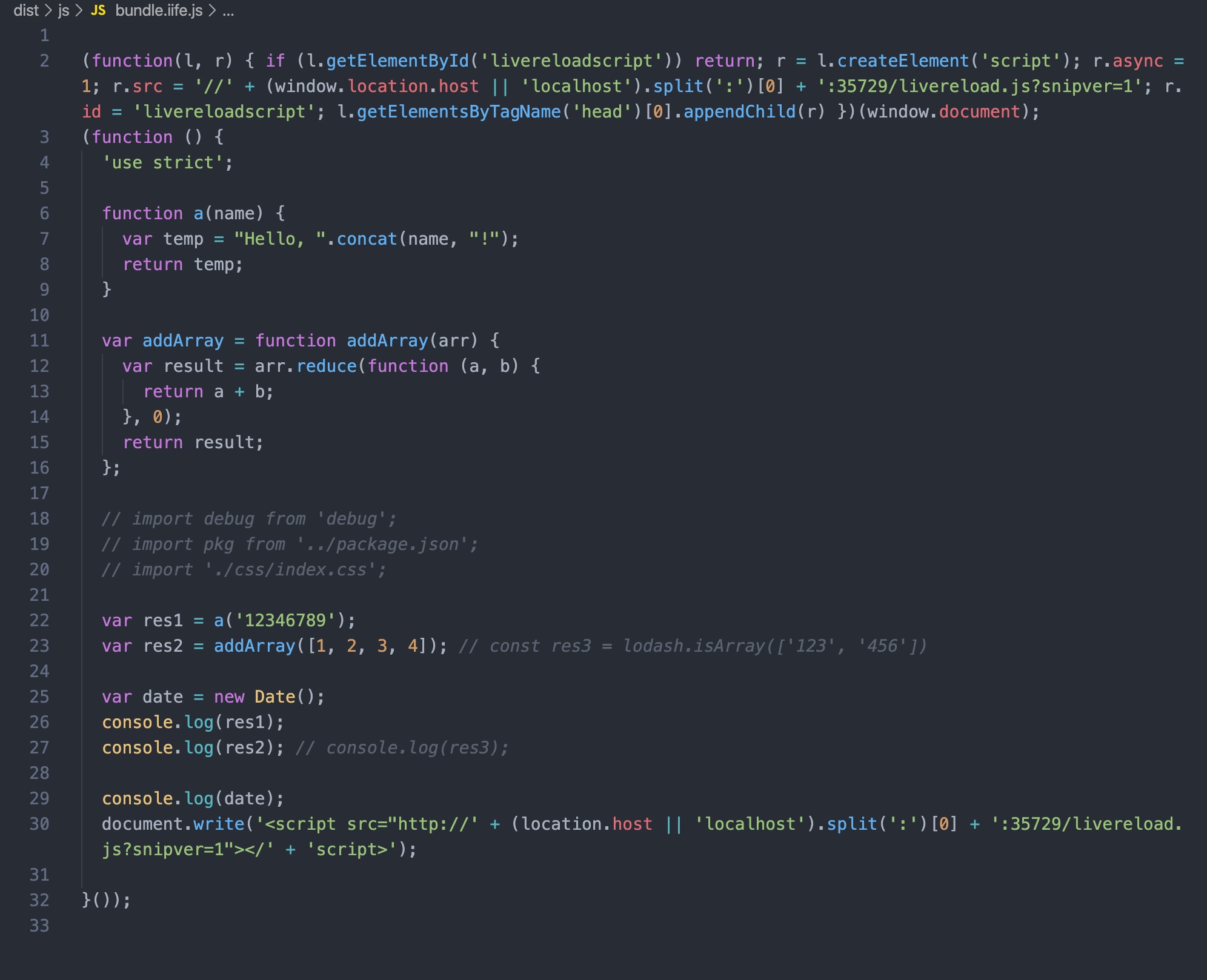
commonjs格式 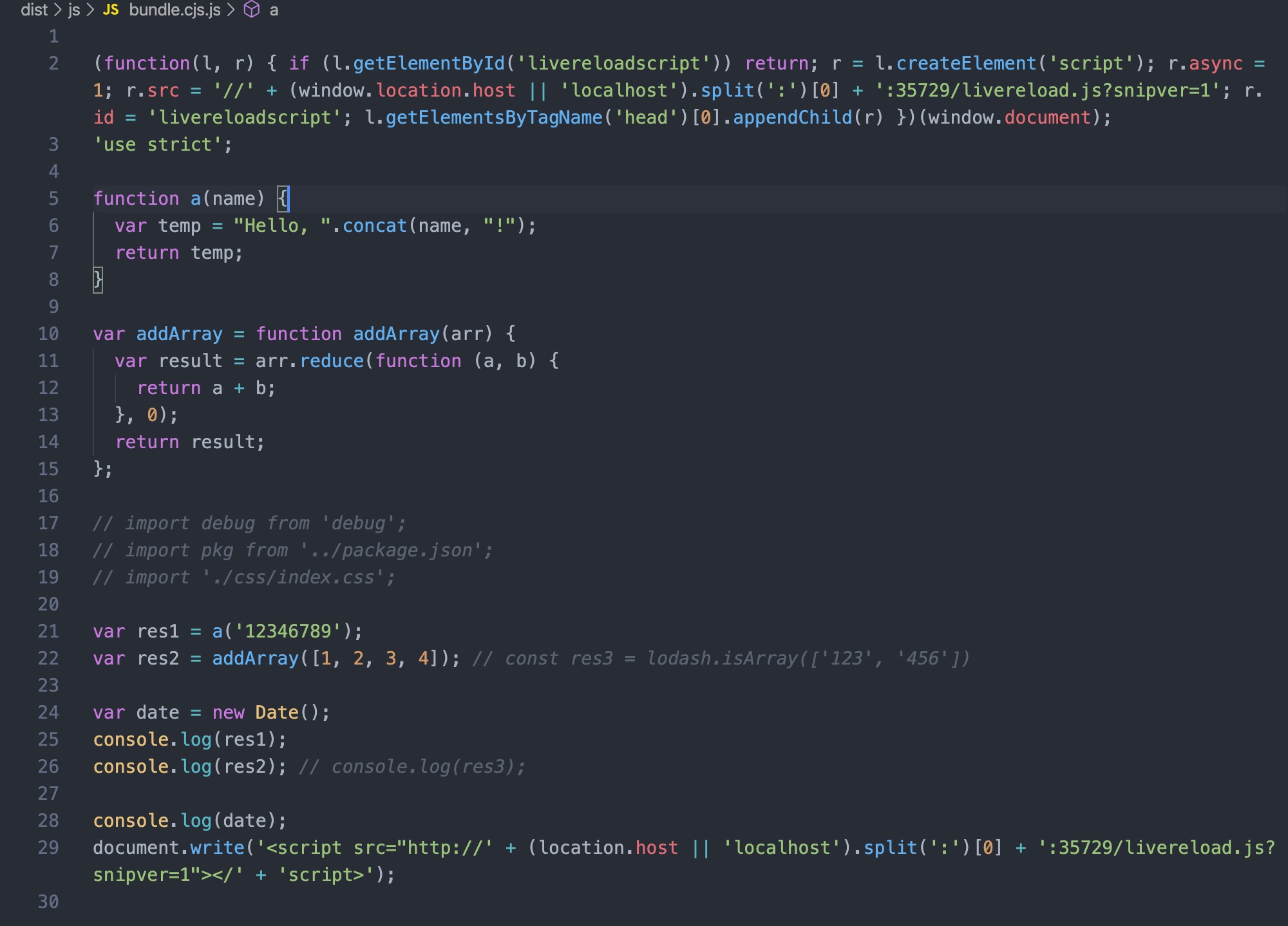
umd格式 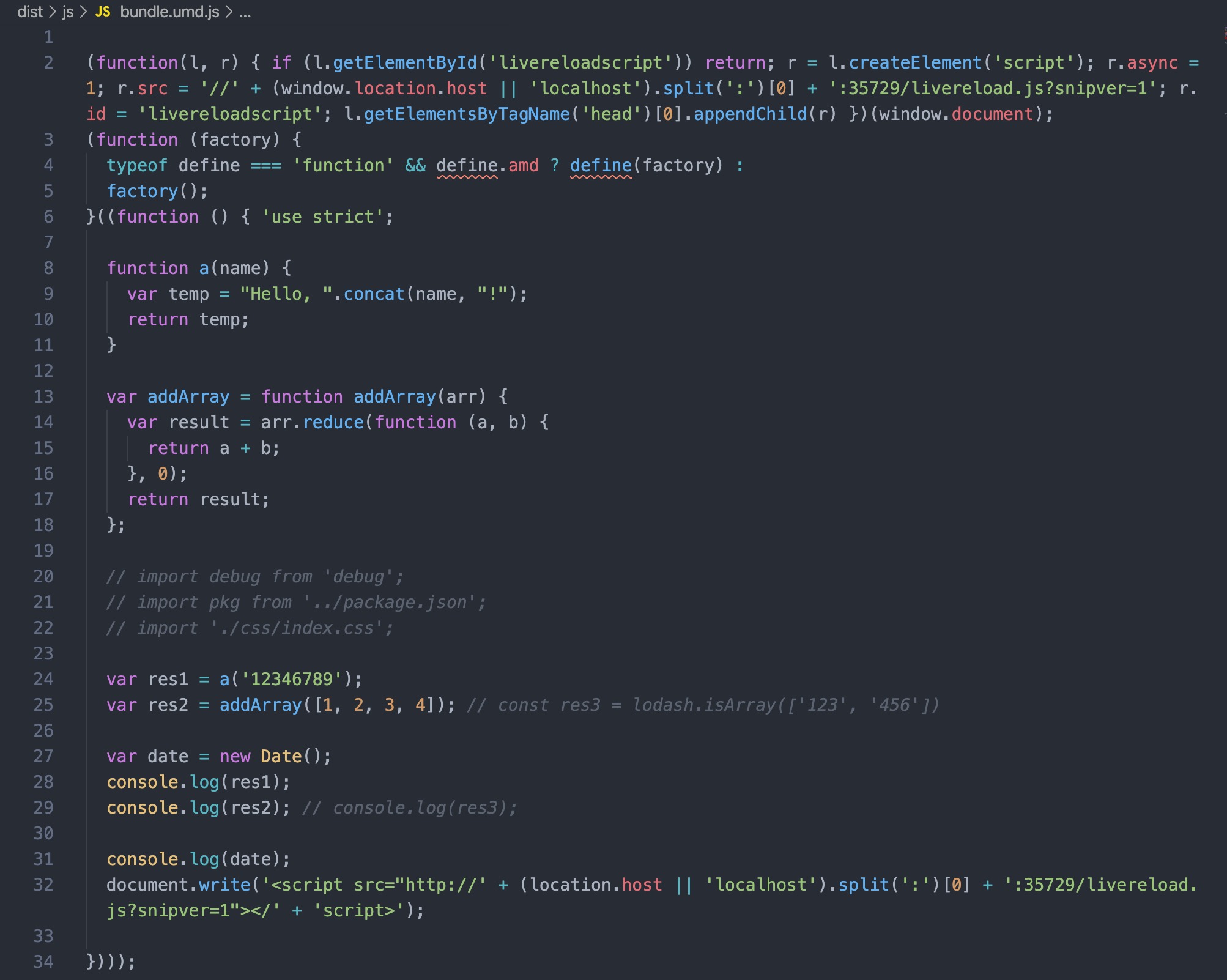
es6格式 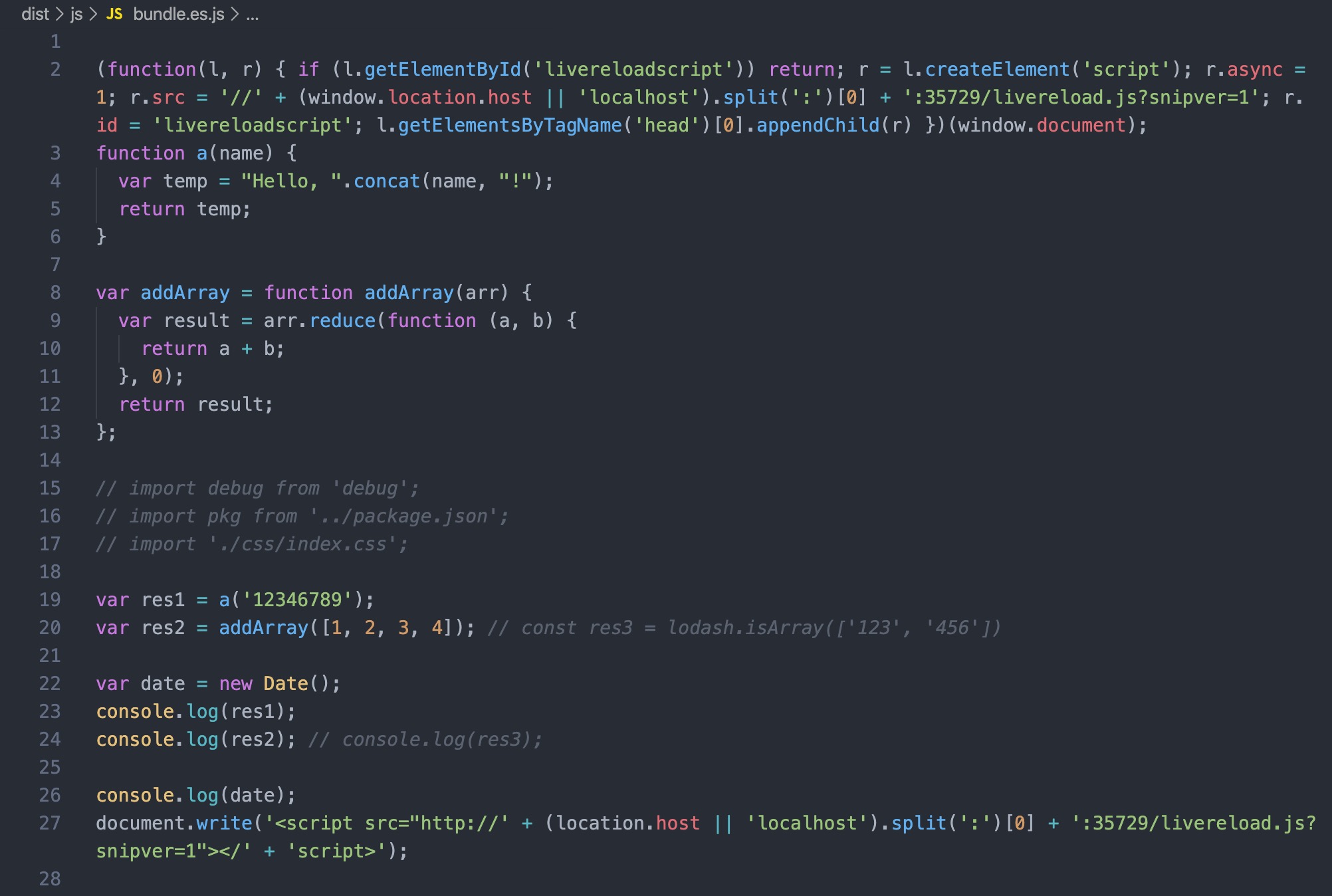
接着在 package.json配置,这样当我们执行 yarn rollupBuild即可完成打包
"scripts": {
"rollupBuild": "rollup -c",
},
先来看一个简单的栗子:
文件的结构如下:
- src
- utils
- a.js
- b.js
- css
- index.css
- index.js
- index.html
- rollup.config.js
- babel.config.js
- package.json
a.js 文件内容
export function a(name) {
const temp = `Hello, ${name}!`;
return temp;
}
export function b(name) {
const temp = `Later, ${name}!`;
return temp;
}
b.js 文件内容
const addArray = arr => {
const result = arr.reduce((a, b) => a + b, 0);
return result;
};
export default addArray;
index.js 文件内容
import { a } from './utils/a';
import addArray from './utils/b';
const res1 = a('1234');
const res2 = addArray([1, 2, 3, 4]);
console.log(res1);
console.log(res2);
执行yarn rollupBuild打包后的 main.min.js 文件
(function () {
'use strict';
function a(name) {
const temp = `Hello, ${name}!`;
return temp;
}
const addArray = arr => {
const result = arr.reduce((a, b) => a + b, 0);
return result;
};
const res1 = a('1234');
const res2 = addArray([1, 2, 3, 4]);
console.log(res1);
console.log(res2);
}());
从上面可以看到a.js中的 b 函数没有被使用,所以打包就没有被打包进来。细心的朋友会发现,上面引用了一个箭头函数,虽然 rollup支持了解析 import和export两种语法,但却不会将其他的 ES6代码转换成ES5,如果是旧版的浏览器,不支持ES6的话是无法直接使用的,这时候就需要添加Babel
设置 Babel 使旧版本浏览器支持 ES6
首先安装一些相关依赖
@babel/core
@rollup/plugin-babel // 一个Rollup插件,用于Rollup和Babel之间的无缝集成
创建babel.config.js文件
module.exports = {
presets: [
[
"@babel/preset-env",
{
// "amd"|"umd"|"systemjs"|"commonjs"|"cjs"|"auto"|false,默认为"auto"
"modules": false, // 启用将 ES6模块语法转换为其他模块类型的功能。要设置false(则不会转换模块),否则 Babel会在 rollup 有机会做处理前将模块转换成其他模式
}
]
],
plugins: [
["@babel/plugin-transform-runtime"]
]
}
(有关预设配置 https://www.babeljs.cn/docs/babel-preset-env)
配置好babel.config.js文件,现在将插件添加进rollup.config.js,为了避免转译第三方插件,需要设置一个exclude选项忽略node_modules目录下的所有文件
import babel from '@rollup/plugin-babel';
export default {
input: './src/main.js',
output: {
file: './dist/js/main.min.js',
format: 'iife'
},
plugins: [
babel({
exclude: 'node_modules/**', // 排除node_module下的所有文件
babelHelpers: 'runtime' // 结合 @babel/plugin-transform-runtime 使用
})
]
}
babelHelpers的选项:(默认为 bundled)
- runtime :使用 rollup构建库时,应该选择此配置,必须配合
@babel/plugin-transform-runtime使用,并将其指定@babel/runtime为包的依赖项(捆绑 cjs& es格式时,不要忘了告诉 rollup将其视为外部依赖项) - bundled :如果要让结果包包含那些帮助程序(每个帮助程序最多一个副本),则应该使用该选项
- external :将在全局
babelHelpers对象上引用帮助程序,与@babel/plugin-external-helpers结合使用 - inline :不建议使用此选项,将会在每个文件中插入帮助程序,会导致代码重复
再打包后main.min.js文件内容如下:
(function () {
'use strict';
function a(name) {
var temp = "Hello, ".concat(name, "!");
return temp;
}
var addArray = function addArray(arr) {
var result = arr.reduce(function (a, b) {
return a + b;
}, 0);
return result;
};
var res1 = a('1234');
var res2 = addArray([1, 2, 3, 4]);
console.log(res1);
console.log(res2);
}());
对比没有添加 Babel时打包的结果可以知道,这时候的 addArray箭头函数已经解析成普通的函数,能够运行在较低版本的浏览器
如果需要使用第三方库,像很常用的 lodash,是不是直接 yarn add后直接 import进来就能使用呢?我们试试
index.js 文件内容
import { a } from './utils/a';
import addArray from './utils/b';
import lodash from 'lodash'
const res1 = a('1234');
const res2 = addArray([1, 2, 3, 4]);
const isArray = lodash.isArray(['123', '456'])
console.log(res1);
console.log(res2);
console.log(isArray);
打包后的 main.min.js文件内容
(function (lodash) {
'use strict';
lodash = lodash && Object.prototype.hasOwnProperty.call(lodash, 'default') ? lodash['default'] : lodash;
function a(name) {
var temp = "Hello, ".concat(name, "!");
return temp;
}
var addArray = function addArray(arr) {
var result = arr.reduce(function (a, b) {
return a + b;
}, 0);
return result;
};
var res1 = a('1234');
var res2 = addArray([1, 2, 3, 4]);
var res3 = lodash.isArray(['123', '456']);
console.log(res1);
console.log(res2);
console.log(res3);
}(lodash));
index.html 文件内容
<!doctype html>
<html lang="en">
<head>
<meta charset="utf-8">
<meta name="viewport"
content="width=device-width,minimum-scale=1,initial-scale=1">
<title>Learning Rollup</title>
</head>
<body>
<p class="header">
Let’s learn how to use <a href="http://rollupjs.org/">Rollup</a>.
</p>
<!-- This is the bundle generated by rollup.js -->
<script src="../dist/js/main.min.js"></script>
</body>
</html>
当我们直接访问 index.html时,会发现浏览器报错了 Uncaught ReferenceError: lodash is not defined
为什么会是 undefined呢?这是因为一般情况下,第三方 node模块并不会被 rollup直接加载,node模块使用的是 CommonJs规范,因此不会兼容 rollup而直接被使用,为了解决这个问题,可以添加一些插件来处理 node依赖和 CommonJs模块
插件
rollup-plugin-node-resolve: 允许加载 node_modules中的第三方模块
rollup-plugin-commonjs:将 CommonJs模块转换为ES6来为 rollup兼容
在 rollup.config.js中添加插件
import babel from '@rollup/plugin-babel';
import resolve from 'rollup-plugin-node-resolve';
import commonjs from 'rollup-plugin-commonjs';
export default {
input: './src/main.js',
output: {
file: './dist/js/main.min.js',
format: 'iife'
},
plugins: [
babel({
exclude: 'node_modules/**', // 排除node_module下的所有文件
babelHelpers: 'runtime' // 结合 @babel/plugin-transform-runtime 使用
}),
resolve({
jsnext: true, // 该属性是指定将Node包转换为ES2015模块
main: true, // main 和 browser 属性将使插件决定将那些文件应用到bundle中
browser: true
}),
commonjs()
]
}
这时,我们重新打包一次,再打开 index.html浏览器就能正常显示不会报错啦
此时打包结果为:
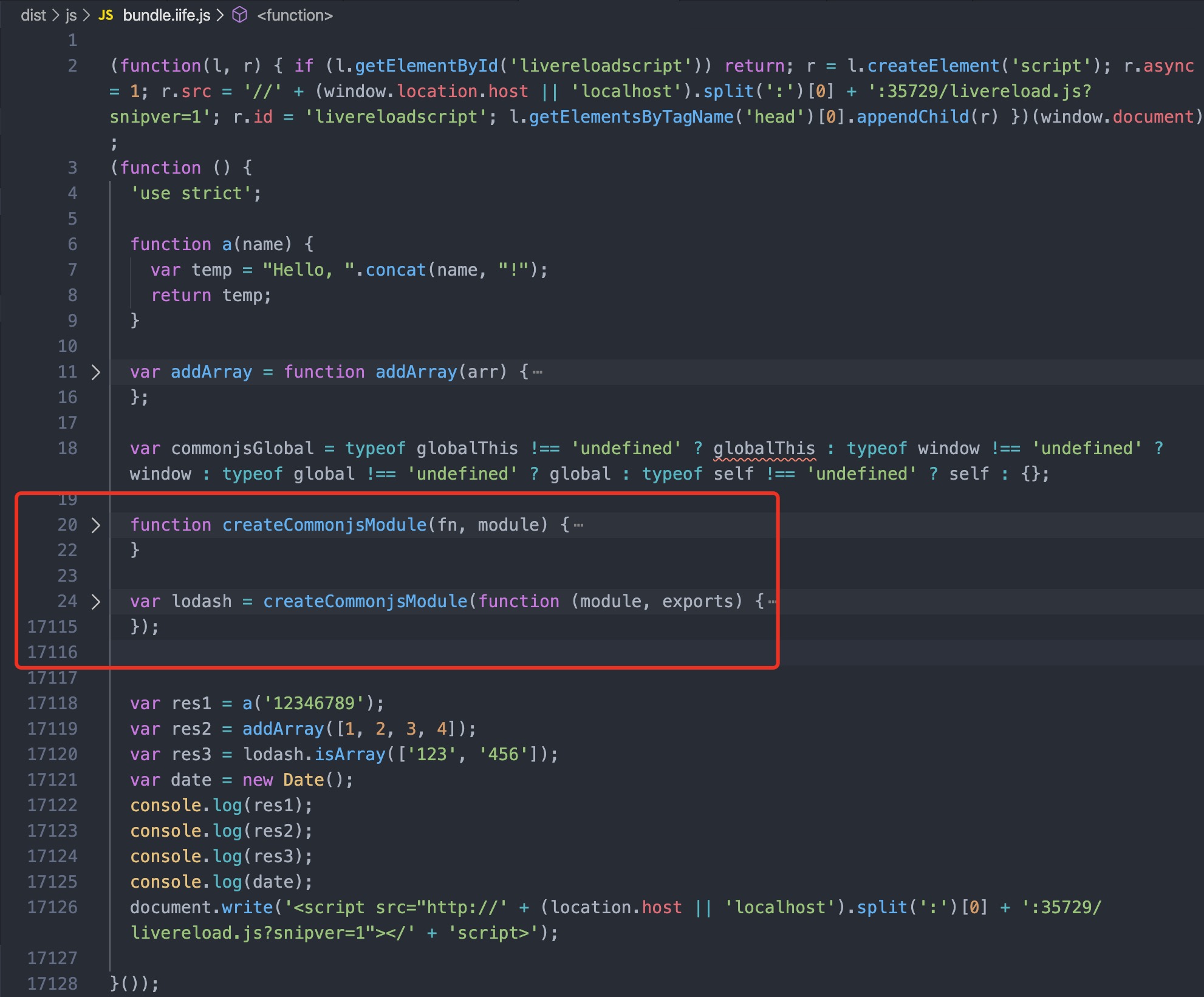
可以看到,整个 lodash库都被打包进来了,代码量一下子就多了起来,能不能让他们作为单独的模块或文件来引用?这时候可以利用 rollup的 external属性,在配置文件rollup.config.js中添加:
output: {
file: './dist/js/bundle.iife.js',
format: 'iife',
// ++
globals: {
lodash: '_'
},
// ++
external: ['lodash']
}
external 这个配置是用来表示一个模块是否要被当成外部模块使用,属性的值可以是一个字符串数组或一个方法,当传入的是一个字符串数组,这个数组内的模块名都会被当成是外部模块,不会打包到最终的文件
globals 这个配置是一个对象,key使用的是模块名称(npm模块名),value表示在打包文件中引用的全局变量名
注意:使用 external配置后,需要从外部重新引入(如 cdn方式)这个模块,否者就会报错:

外部引入模块:
// ++
<script src="https://cdn.bootcss.com/lodash.js/4.17.15/lodash.core.js"></script>
<script src="../dist/js/bundle.iife.js"></script>
rollup-watch: 监听文件变化,即时打包
接着在 package.json配置,这样当我们执行 yarn rollupBuild即可完成打包
"scripts": {
"rollupBuild": "rollup -c",
"watch": "rollup -c -w"
},
执行一遍 yarn watch后,我们直接打开 index.html文件,直接修改 index.js的内容就能触发 watch重新打包并在浏览器更新变化了
补充:如果不想监听某些文件变化 可以在 rollup.config.js配置文件中加上:
import watch from 'rollup-watch'
//++
plugins: [
watch: {
exclude: 'node_modules/**' // 排除node_module下的所有文件
}
]
rollup-plugin-serve: 开启本地服务
在 rollup.config.js中添加插件
import babel from '@rollup/plugin-babel';
import resolve from 'rollup-plugin-node-resolve';
import commonjs from 'rollup-plugin-commonjs';
import serve from 'rollup-plugin-serve';
export default {
input: './src/main.js',
output: {
file: './dist/js/main.min.js',
format: 'iife'
},
plugins: [
babel({
exclude: 'node_modules/**', // 排除node_module下的所有文件
babelHelpers: 'runtime' // 结合 @babel/plugin-transform-runtime 使用
}),
resolve({
jsnext: true, // 该属性是指定将Node包转换为ES2015模块
main: true, // main 和 browser 属性将使插件决定将那些文件应用到bundle中
browser: true
}),
commonjs(),
serve({
open: true, // 是否打开浏览器
contentBase: '.', // 入口html的文件位置
historyApiFallback: false, // Set to true to return index.html instead of 404
host: 'localhost',
port: 10001 // 需要五位数
}),
]
}
当我们执行 yarn rollupBuild时,就能自动打开 http://localhost:10001/了,由于设置的的是根路径,还需要添加成 calhost:10001/src/index.html 才能真正访问目标文件
rollup-plugin-livereload: 实时刷新界面
注入LiveReload脚本:
在LiveReload工作前,需要向页面中注入一段脚本用于和LiveReload的服务器建立连接。
在 index.js 中加入如下一段代码:
// Enable LiveReload
document.write(
'<script src="http://' + (location.host || 'localhost').split(':')[0] +
':35729/livereload.js?snipver=1"></' + 'script>'
);
接着运行命令去监听目录:
./node_modules/.bin/livereload 'src/'
会得到如下结果;Starting LiveReload v0.9.1 for /Users/kayliang/Documents/个人提升/前端/vue-demo/babel-temp/src on port 35729.
告诉我们监听成功,这时我们执行 yarn rollupBuid 后打开 index.html文件,在index.html修改内容后保存会看到页面自动刷新内容了
我们还可以这样优化:在 package.json的 scripts中添加命令:
"scripts": {
"watch": "rollup -c -w",
"rollupBuild": "rollup -c",
"reload": "livereload 'src/'"
},
就能简化过程,无需执行 ./node_modules/.bin/livereload 'src/' 命令
但这个插件只能监听 src下的文件变化,并不能再往下监听其他文件,因为它不能自动打包,这需要 watch插件共同完成,但我们又不能同时打开 watch 和 livereload 这就出现了 all插件
rollup-all: 共同开启 watch 和 livereload
rollup-all 旨在使一个终端可以执行多个任务,我们只需要在 package.json中再添加一条脚本:
"scripts": {
"watch": "rollup -c -w",
"rollupBuild": "rollup -c",
"reload": "livereload 'src/'",
"all": "npm-run-all --parallel watch"
},
这时我们执行 yarn all后刷新浏览器,改变 js或 css,浏览器就能自动加载更新后的代码
rollup-plugin-postcss: 打包样式文件
在 index.js文件中引入新的 index.css文件
// ++
import './css/index.css';
接着,需要在 rollup.config.js中设置相关配置:
// ++
import postcss from 'rollup-plugin-postcss';
plugins: [
// ++
postcss({
extensions: ['.css']
})
]
执行 yarn all后,可以发现,生成的main.min.js文件内容如下:
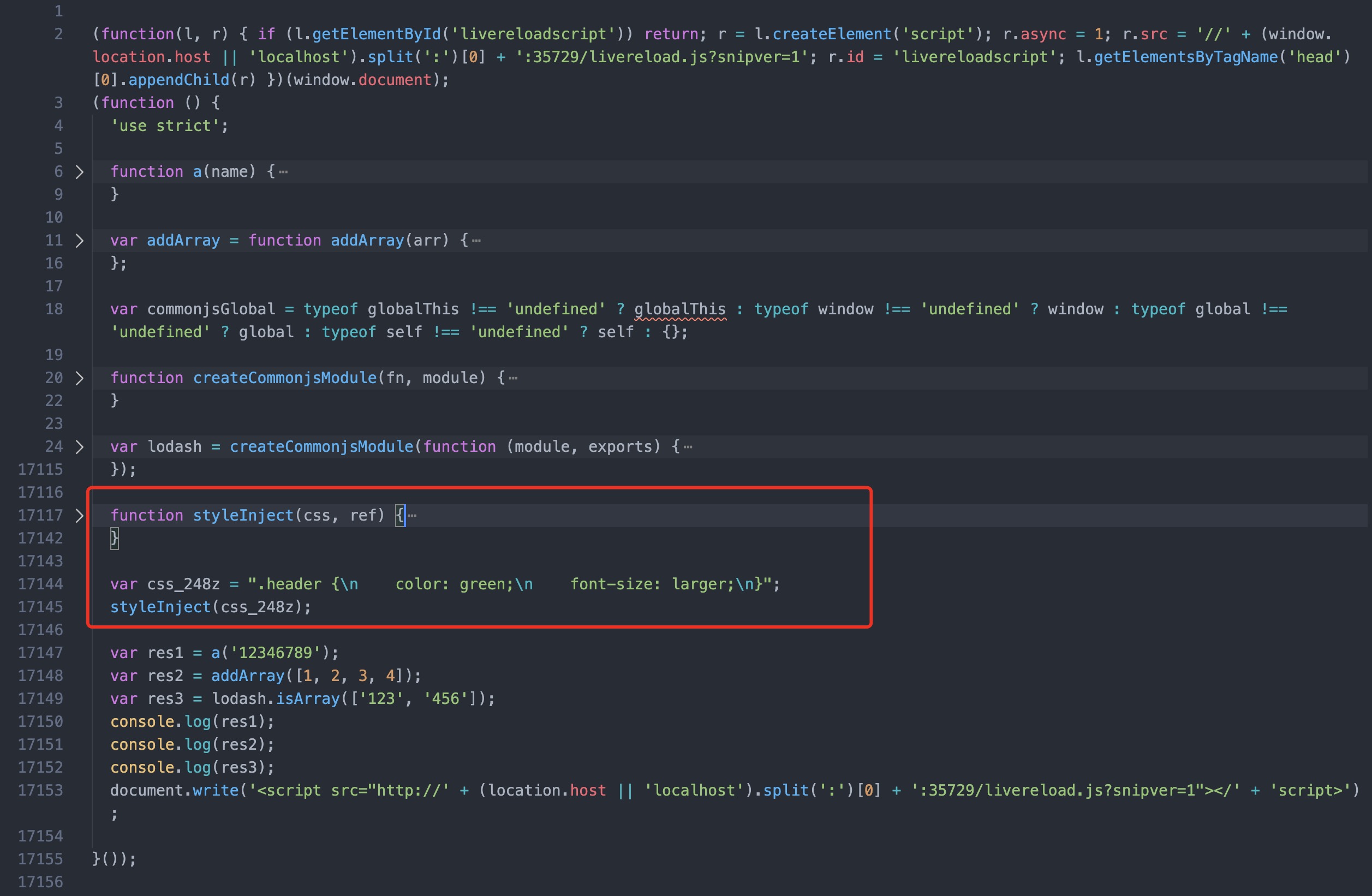
这个 styleInject() 函数创建了一个 <style>标签并设置了样式,接着便把 css文件添加对应文件的 <head>标签中
除此之外,还有几个配合 css较常使用的插件:
postcss-simple-vars: 可以使用Sass风格的变量(e.g. myColor: #fff;,color:myColor;)而不是冗长的CSS语法(e.g. :root {--myColor: #fff},color: var(--myColor))。
postcss-nested: 允许使用嵌套规则。实际上我不用它写嵌套规则;
postcss-cssnext: 这个插件集使得大多数现代CSS语法(通过最新的CSS标准)可用,编译后甚至可以在不支持新特性的旧浏览器中工作。
cssnano: — 压缩,减小输出CSS文件大小。相当于JavaScript中对应的UglifyJS
参考资料
- Rollup.js 教程 —— 比较详细的系列教程。